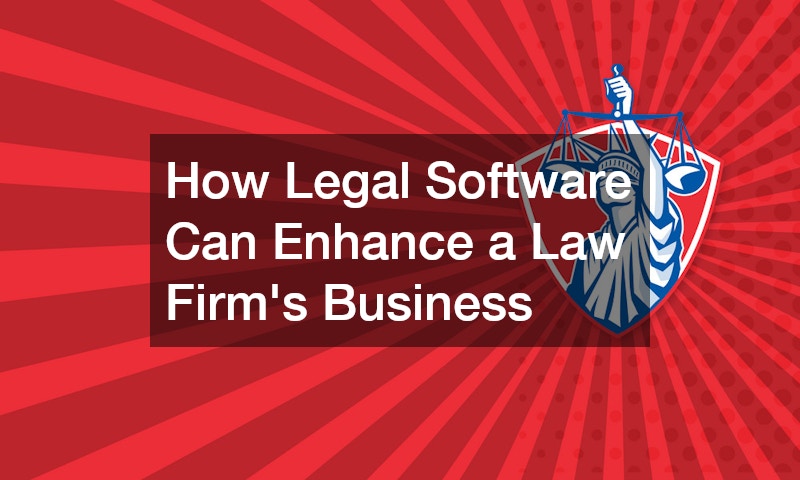The legal industry is undergoing a significant transformation due to the increasing integration of technology, which is becoming increasingly essential for maintaining competitiveness and effectiveness. This integration is seen in the growing adoption of specialized legal software solutions designed to enhance operational efficiency. Law firms are leveraging these technologies to enhance their business performance, providing superior client management and streamlined operations that meet modern demands.
What are the Key Benefits of Implementing Legal Software?
Legal software dramatically enhances efficiency by automating many of the labor-intensive tasks that have traditionally bogged down law firms. By reducing the time attorneys spend on routine administrative tasks, legal software enables firms to allocate more resources toward high-value client interactions and case preparation. Moreover, the ability to handle larger caseloads effectively stems from streamlined workflows, enabling firms to scale their operations without a proportional increase in overhead.
Many legal software solutions offer integrated task management features, eliminating bottlenecks and ensuring that deadlines are met without unnecessary complications. Automation reduces the likelihood of human error, which can be particularly critical in environments where accuracy is paramount. This organizational boost not only saves time but also enhances service delivery, further driving client satisfaction.
Enhancements in scheduling, document management, and billing processes enable attorneys to focus less on mundane operational tasks and more on strategy and advocacy. With these improvements, legal teams can approach complex cases with greater confidence, knowing that their time and resources are being utilized optimally. Firms that leverage technology effectively report higher client retention rates and are more agile in responding to client needs.
How Does Legal Software Support Client Relationship Management?
Legal software supports superior client relationship management through comprehensive CRM features specifically tailored for law firm environments. These CRM systems track every communication, ensuring that nothing is overlooked and that attorneys have a complete history for reference at all times. Clients benefit from this consistency and personalized attention, which builds trust and loyalty over time.
The integration of multi-channel communication tools into legal software platforms enables firms to engage with clients according to their preferences, whether via email, phone, or video conferencing. Such platforms often include client portals, allowing clients to access case updates and relevant documents at their convenience, thus enhancing transparency and satisfaction. Enhancing client experience is crucial as it directly influences client retention and referrals, which are vital for a law firm’s growth.
Furthermore, CRM systems enable the tailoring of client interactions by analyzing data on past communications, thereby helping firms better understand client behavior and preferences. This insight allows law firms to offer more personalized services, anticipate client needs, and proactively manage relationships. Improving client experience through meticulous relationship management leads to higher client satisfaction scores and increased repeat business.
What are the Security Advantages of Legal Software?
Security is a paramount concern for law firms handling sensitive client information, and legal software provides robust solutions to address this. These software solutions incorporate advanced encryption technology, ensuring data protection both in transit and at rest. Access controls, which enable staff to be granted or denied access to specific information based on their role, further enhance data protection.
Legal software frequently features audit trails, which log every access and modification made within the system. These logs are instrumental in preventing unauthorized data alterations and provide accountability that boosts client confidence. Risk management tools also contribute by identifying potential vulnerabilities and suggesting best practices to mitigate them, thereby strengthening the firm’s overall data security posture.
Incorporating legal software with these security measures assures clients that their sensitive information remains confidential and compliant with global data protection regulations, such as GDPR. This assurance is critical in maintaining and enhancing a firm’s reputation in safeguarding client interests. The added security layer serves as a differentiator in a competitive market, attracting clients who prioritize data confidentiality.
How Can Legal Software Assist in Data Analysis and Decision Making?

Legal software is equipped with powerful analytics tools that enable law firms to harness data for strategic decision-making. By analyzing trends and patterns within the firm’s operations, legal software provides previously inaccessible insights, helping firms make data-driven decisions. These insights can pinpoint areas where the firm excels or needs improvement, allowing for targeted strategic planning.
Decision-making processes are considerably enhanced with the support of these analytics, as they facilitate accurate forecasting and risk assessment. Legal software can project potential outcomes based on historical data, thereby informing better investment and management decisions. By leveraging these analytical tools, firms position themselves to adapt quickly to market changes and capitalize on new opportunities, which supports sustained growth.
The deployment of legal software has a significant impact on a law firm’s business operations, enhancing efficiency, improving client relations, ensuring data security, and facilitating informed decision-making through the effective use of data. These transformative benefits not only streamline current operations but also lay the groundwork for innovative future advancements. As the legal field continues to evolve, law firms must embrace these technologies to maintain competitive relevance and drive sustained business growth.
